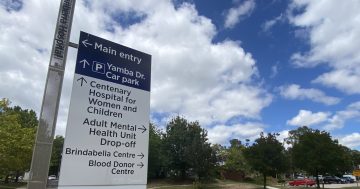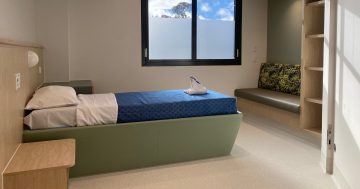
Jessica McBrien (right) and her daughter Abby: “A doctor at a Canberra hospital admitted to us that the hospital didn’t have any services to help her.” Photo: Supplied.
The ACT Government has updated its position statement on eating disorders, but families say the services available in Canberra are still inadequate and failing their vulnerable loved ones.
Speaking in the Assembly on Wednesday (25 October), Mental Health Minister Emma Davidson said the Territory Government is committed to improving eating disorder services in the ACT across the full spectrum of care.
“Eating disorders are serious illnesses that can have significant impacts on the physical, psychological, and social-emotional wellbeing of the individuals and families affected,” she said.
“People with eating disorders often present with symptoms that can vary in severity, acuity, complexity and risk. As a result, managing eating disorders can be extremely complex. There is a need for a system-wide integrated eating disorder service spectrum that is developmentally appropriate and flexible across the entire continuum of care, from early engagement to ongoing treatment and addressing fluctuations in risk and condition.”
Ms Davidson said the ACT had expanded its eating disorder services in a number of ways over the past year, including the development of a Territory-wide model of care for eating disorders, the establishment of a rapid early intervention service for adults with eating disorders, and the announcement of a new residential treatment centre to be operated by Canberra Health Services.
The 12-bed public residential care centre for eating disorders in Coombs is set to be the first of its kind in Australia. It will mean people with eating disorders and their loved ones no longer have to travel interstate for treatment and pay thousands of dollars for private facilities.
“The centre will fill a critical gap between inpatient hospitalisation and outpatient programs to provide an opportunity for a more intensive psychological recovery and improved integration of services,” Ms Davidson said.
The centre is currently under construction and is expected to open in mid-2024.
However, for families like the McBriens, that date comes too late.
Jessica McBrien told Region her experience supporting her 20-year-old daughter Abby as she seeks treatment for anorexia has been frustrating and difficult.
She was forced to look beyond Canberra for treatment.
“As my focus was on saving my daughter’s life, we explored and attended residential inpatient programs in NSW and Victoria. Canberra families struggle to find a GP, dietitian and psychologist who have experience or understanding of eating disorders,” Jessica said.
“To date, years into this journey, we have not been able to find a private psychiatrist, a vital member of an eating disorder treatment team and essential to be eligible for an Eating Disorder Plan under Medicare. We were advised to explore options in Sydney as Canberra lacked the required services and supports.
“The things said to my daughter in hospital by medical professionals did not help her to recover and demonstrated to me they did not understand anorexia was a mental illness; instead, they perceived it to be a physical illness that was only about food. This is not the case. The hospital treatment offered in many cases was only medical stabilisation without consideration of the mental aspects of the illness. Until both the physical and mental are treated, the eating disorder cycle continues.
“My daughter was also able to self-discharge – against medical advice – as she was over 18. A doctor at a Canberra hospital admitted to us that the hospital didn’t have any services to help her.”
Inpatient treatment is extremely expensive and is not an option for many families. Abby has been an inpatient at a facility on the Sunshine Coast for more than four months. The initial 60-day stay cost more than $90,000.
She has covered the out-of-pocket expenses of her daughter’s treatment to date, using all her savings, credit and some superannuation. She has launched a fundraiser appeal to help raise money for Abby’s treatment.
“The financial and emotional cost is crippling,” Jessica said.
“If the ACT Residential Treatment Centre for eating disorders had not been delayed and were open now, it would have been of benefit to my daughter’s recovery.
“If we did not have to travel interstate, it would have saved time, stress, so much money and ultimately helped my daughter to recover sooner and not create distance from her friends and family, and losing as many years of her life to anorexia.
“Increased eating disorder awareness and training for GPs and hospital staff, greater access to medical professionals and more eating disorder funding under Medicare would go a long way to helping people recover sooner from eating disorders, reducing the financial impact and helping families who are fighting this illness 24/7.”
If you are concerned about an eating disorder or body image issues and need support for yourself or someone you care about, the Butterfly Foundation’s support line is available on 1800 33 4673 (1800 ED HOPE).




















